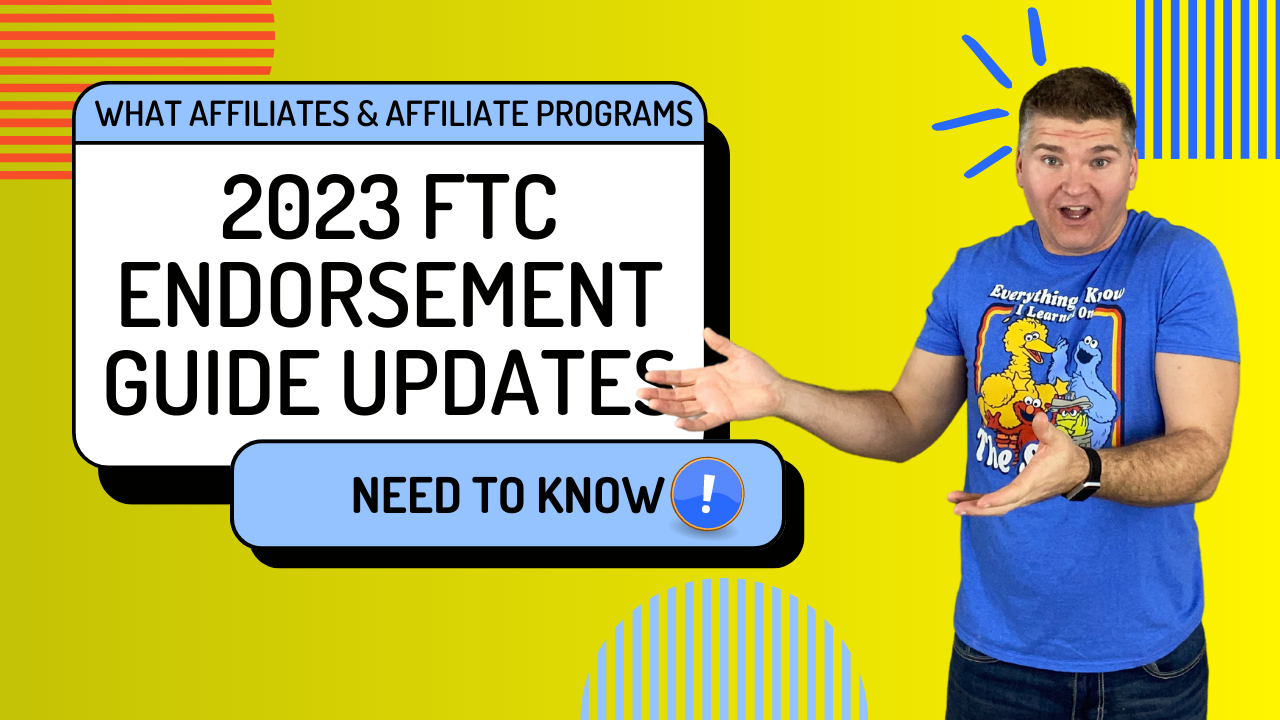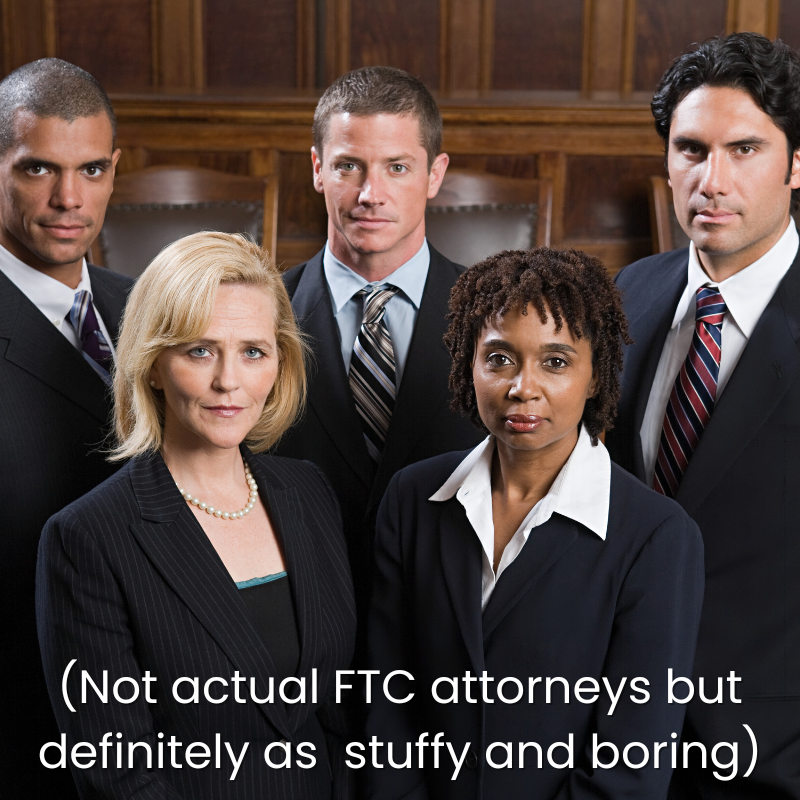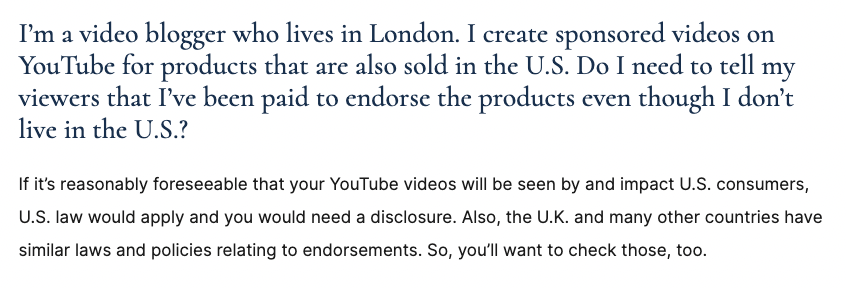
In the world of affiliate marketing, big news has just hit the scene. The Federal Trade Commission (FTC) has recently released updated guidelines that are set to have a major impact on affiliate marketers and affiliate programs. You might be wondering, are these changes good or bad, and what exactly do they entail? Well, fear not, because in this post, we’ve got you covered with all the details.

Let’s start by understanding what the Endorsement Guide is all about. This guide is the source of the disclosure rules that affiliates, influencers, and other marketers must adhere to. Essentially, it requires affiliates to disclose their affiliation when promoting products or services.
Surprisingly, we’ve been expecting these updates for quite some time. The term “influencers” has been around for about seven or eight years, so it’s a wonder why these guidelines didn’t come out earlier, perhaps in 2018 or 2019. But, hey, we’re dealing with a government agency here, and bureaucratic processes tend to be slow.
The FTC proposed the guideline changes back in May or June of 2022, and after much anticipation, they were officially released in late June 2023. Although we’ve been waiting for this, there aren’t many surprises in these updates as most of them were proposed over a year ago.
The Clarity and Confusion of the FTC’s Endorsement Guide
These new guidelines aim to clarify some previously ambiguous areas, but they also left some gray areas intact, which can be a bit frustrating. We’d love to see some black-and-white answers, but unfortunately, we’ll have to work with what we’ve got.
Before we delve further into the details, I must emphasize that the content of this post is intended to provide accurate and authoritative information. However, it should not be considered legal, accounting, or professional advice. If you require any such assistance, it is essential to consult a qualified and licensed attorney, not just a blogger. You should also read the official Endorsement Guide updates for 2023 directly from the FTC here.
My Personal Encounter with the FTC
 Having faced a lawsuit myself, I can attest to the gravity of the situation. I vividly remember spending two full days in a conference room with FTC attorneys who barely understood how to use the internet, let alone anything about marketing. In the transcript of our 16 hours together, they constantly referred to “Pay Per Click” marketing as “Paper Clip” marketing. It took everything in me not to just laugh, but when you’re facing a giant government agency, you have to take these things seriously.
Having faced a lawsuit myself, I can attest to the gravity of the situation. I vividly remember spending two full days in a conference room with FTC attorneys who barely understood how to use the internet, let alone anything about marketing. In the transcript of our 16 hours together, they constantly referred to “Pay Per Click” marketing as “Paper Clip” marketing. It took everything in me not to just laugh, but when you’re facing a giant government agency, you have to take these things seriously.
Although the lawsuit against me was eventually dropped, it still required considerable time, effort, and legal expenses to demonstrate that I had done nothing wrong. That experience highlighted the importance of ensuring strict adherence to legal guidelines.
I MUST Know This Stuff
As someone deeply involved in affiliate marketing, running multiple affiliate programs, and being in the agency world, I feel a responsibility to stay on top of these developments. So, I consulted our attorney, who, in turn, sought advice from a specialized attorney in this field. He broke things down for me in clear, simple English and answered some specific questions I had about the new FTC guidelines.
Now, let’s address the elephant in the room. Are these new guidelines a nightmare that will wreak havoc on affiliate marketers’ lives? The answer is no. It’s not as dreadful as some may fear. In fact, for most people, it won’t add more than half an hour to an hour of work per month for affiliate managers and others involved.
Before we proceed further, it’s essential to acknowledge that this might not be the most exciting post, as it primarily concerns compliance with the law rather than sales-boosting strategies. While I can undoubtedly help you achieve remarkable sales growth and success, none of that matters if you’re not operating within the legal boundaries. Facing a lawsuit, even if unjustified, can be an arduous and costly ordeal.
The Silver Lining: Not All Doom and Gloom
Despite the initial panic that may arise when the new guidelines were announced, this situation isn’t all bad news. In reality, the vast majority of affiliates are already complying with about 90% of the rules laid out in the FTC’s endorsement guidelines. So, if you’re part of this majority, just keep doing what you’re doing!
 For the 10% of affiliates who might not be fully compliant, it’s time to make some adjustments. Fortunately, the changes aren’t overwhelmingly complex, and with some guidance, you can easily get on the right track. However, let me reiterate that this is not legal advice, and you should consult a professional if you have any uncertainties.
For the 10% of affiliates who might not be fully compliant, it’s time to make some adjustments. Fortunately, the changes aren’t overwhelmingly complex, and with some guidance, you can easily get on the right track. However, let me reiterate that this is not legal advice, and you should consult a professional if you have any uncertainties.
In my experience, having worked with numerous affiliates over the years, I’d estimate that around 75% of them are already doing things correctly and won’t require any significant changes. As for the remaining 25%, most of them will only need to make minor adjustments to ensure compliance.
Now, you might be wondering what these changes entail. Let’s dive into some of the key points and see how they might affect your affiliate marketing activities.
The Background
Let’s delve into the background of this major development in the affiliate marketing realm. The primary focus of these guidelines is to combat deceptive and dishonest reviews and endorsements. While this objective directly affects every affiliate marketer, it also has a profound impact on affiliate managers, influencers, and anyone who might endorse a product, including bloggers, podcasters, agencies, advertisers, and affiliate networks.
The root cause behind these guidelines stems from the need to address the tiny fraction, perhaps as little as 1/20th of 1%, of individuals who engage in writing fake and dishonest reviews. Unfortunately, this minority of bad apples has resulted in all of us having to navigate the newly introduced compliance hoops. Nevertheless, let’s delve into the specifics and see how these guidelines might influence your affiliate marketing strategies.
You may wonder whether these guidelines specifically target affiliate marketers. While the short answer is yes, the bulk of the focus is directed toward influencers and affiliates who receive financial incentives for endorsements. The guidelines are not intended for everyday reviewers expressing their honest opinions about products or services, but rather for individuals with a monetary motivation to promote items positively—often, these are affiliates.
Highlights and Specifics: Navigating the New Guidelines
To better grasp the implications of these guidelines, let’s explore some key highlights, based on legal advice, and understand the specific actions you should take to comply.
If you find anything unclear, your first course of action should be reading the guidelines, and if necessary, seeking advice from a qualified attorney to ensure full compliance.
FTC’s Definition of Endorsement
To fully grasp the implications of these guidelines, we need to understand what the FTC defines as an endorsement. According to their guidelines, an endorsement is an advertising message that consumers are likely to believe reflects the opinions or beliefs of someone other than the sponsoring advertiser. In essence, as affiliates, when we promote a product or service, we are essentially endorsing it on behalf of the marketer.

As affiliates, we are not the advertisers, owners of the company, or the product itself. Yet, we find ourselves endorsing and expressing opinions about products in various media channels. The FTC’s Endorsement Guides are designed to ensure truth in advertising across all media platforms, be it the longstanding television and magazines or the relatively newer phenomenon of social media.
FTC’s Endorsement Guides: The Social Media Impact
A common question has been asked: Are social media influencers, bloggers, and content creators compensated to promote products?
 While it might be common knowledge that some of them receive payment for their endorsements and commissions from product sales, others genuinely recommend products because they believe in their value. The existence of financial arrangements between content creators and advertisers might be apparent to some but not to everyone.
While it might be common knowledge that some of them receive payment for their endorsements and commissions from product sales, others genuinely recommend products because they believe in their value. The existence of financial arrangements between content creators and advertisers might be apparent to some but not to everyone.
The FTC emphasizes that deceptive practices mislead “a significant minority” of consumers, making disclosure crucial. However, the term “significant minority” lacks a specific definition, leaving room for interpretation. The objective is to ensure that even individuals outside the marketing world, like your 82-year-old mom or members of your community, understand the affiliate links and endorsements they come across.
Now, let’s explore some highlights from the latest endorsement guides, mostly clarifications on rules established in 2009 and 2010. However, these updates significantly address the impact of endorsements in the social media landscape.
Expanding Responsibility for Violations
Previously, responsibility for violations primarily fell on the affiliate program and the content creator. If both adhered to guidelines, they were deemed free from liability.
The recent changes now extend this responsibility to include bloggers, podcasters, influencers, affiliates, agencies, and advertisers—effectively encompassing a wide range of individuals in the affiliate marketing world.
A Grey Area: The Role of Affiliate Networks and Tracking Platforms
Interestingly, the FTC guidelines do not explicitly mention the impact on affiliate networks or tracking platforms. This lack of clarity creates uncertainty for those running affiliate programs through such networks. If the network assumes an agency role, they may be affected, but the situation remains ambiguous.
We can only hope that the FTC will provide clearer guidelines in response to inquiries, though their pace might resemble the speed of a snail.
Looking Forward: Navigating the Evolving Social Media Landscape
As the digital landscape continues to evolve, the FTC might propose changes in response to emerging trends. However, predicting the timeline for such updates can be challenging. Regardless, staying informed about the guidelines and adhering to them diligently remains essential to maintain compliance and protect ourselves from potential legal ramifications.
Key Takeaways from the Updated FTC Endorsement Guidelines
Let’s explore the significant takeaways from the FTC’s updated Endorsement Guidelines that are particularly relevant to affiliate marketers and managers.
1. Affiliate Managers and Their Responsibilities
Affiliate managers, advertisers, and affiliate program owners now bear clear responsibilities. The guidelines specify three main duties:
First, provide explicit guidance on the rules to your affiliates. Promptly communicate these guidelines via emails or posts in your Facebook groups to keep everyone informed.
Second, actively monitor compliance. Keep a close eye on your affiliates’ activities and promptly address any rule violations.
Third, take appropriate action if non-compliance occurs. Ensure you handle any issues according to the guidelines.
2. Review Sites and Payments for Rankings
Review websites must avoid accepting payments in exchange for higher rankings of specific brands or products. Engaging in such practices is considered deceptive and can lead to liability for both the website owner and the brand. If you are an affiliate manager caught in the middle, you may also be held liable.
Want to learn how to make passive affiliate income from product review posts? Get my free guide on how to write a review post that ranks and converts and learn how we bring in more than $10,000 every single month in passive affiliate income! Get it here!
3. Clear and Conspicuous Disclosures
The requirement for disclosures to be “clear and conspicuous” has been refined to mean “unavoidable.” The disclosure must be presented in a way that it cannot be missed by the audience interacting with the content. While some gray areas exist, making disclosures unavoidable might be challenging on certain platforms and devices.

4. Social Media Platforms’ Built-in Disclosure Tools
Merely relying on the disclosure tools provided by social media platforms may not be sufficient to meet the clear and conspicuous standard. As an affiliate marketer, it is your responsibility to ensure that the disclosure is evident and unavoidable, regardless of the platform’s tools.
RELATED POST: Top 10 Mistakes Affiliates Make on Social Media
5. Targeted Audience and Effective Disclosures
Effective disclosures vary based on the target audience. If your audience includes children, the elderly, or individuals with disabilities, your disclosures should consider their specific needs to ensure full transparency.
6. Foreign Content Creators Must Comply with US Law
If you’re outside the United States but have an audience inside the US, you must comply with the FTC’s rules.

Important FTC Guidelines for Affiliate Marketers
Here are eight guidelines that stood out as particularly relevant to affiliate marketers:
1. Avoid using simple terms like “affiliate link” or “commissionable link” as adequate disclosures.
Instead, use “paid link” to be more explicit. While this may seem restrictive, it ensures a broader understanding among English-speaking audiences.
2. False Representations and Personal Use of Products
Affiliate endorsers can be held liable if they falsely claim to have used the product themselves. Misrepresenting personal usage could result in severe consequences, including loss of commissions and potential legal action by the FTC.
3. Social Media Tags as Endorsements
Tags in social media posts can be considered endorsements, necessitating proper disclosure. If you have any connection to a brand and tag them in your content, such as receiving free products or compensation, it is considered an advertisement, requiring full disclosure.
4. Profile Page Disclosures
Influencers cannot solely rely on disclosing connections to brands on their profile pages. The disclosure must be visible in the post itself and unavoidable for viewers.
5. Video Disclosures
For videos, you must include adequate disclosure stating the partnership or compensation arrangement with the brand. Specific examples provided by the FTC can be used to ensure proper disclosure.
6. Social Media Disclosures
Social media disclosures must be clear and conspicuous, leaving no room for ambiguity. Hashtags like “ad,” “paid ad,” “advertising,” “advertisement,” “sponsored promotion,” and similar phrases are acceptable. However, merely tagging the brand or using hashtags like “endorsement,” “ambassador,” or “partner” are insufficient.
7. Podcasts and Commercial Content
In podcast episodes, disclosures are not necessary for content obviously identified as a commercial. However, for content that may not be readily identifiable as a commercial, disclosing affiliations with brands is essential.
RELATED POST: How to Monetize Your Podcast with Affiliate Marketing
8. Free Products and Coupon Disclosures
Receiving free products through coupons requires proper disclosure. Even if you use a free product on-camera without direct endorsement, disclosing the arrangement is essential, especially if the product displays branding.
Important Steps for Compliance with FTC Guidelines
Now, let’s discuss some actionable steps to ensure compliance with the FTC guidelines for both affiliate managers and affiliates.
Affiliate Managers:
 1. Educate Your Affiliates
1. Educate Your Affiliates
It is crucial to inform your affiliates about the updated guidelines. Send out emails or notifications to make sure they are aware of the changes. Sharing educational content, such as this post, can be helpful.
Make sure to include this as a part of your affiliate training.
2. Monitor Your Affiliates
While monitoring all affiliates might be challenging for large programs, focus on the top performers first. Keep a close eye on those driving significant sales, and spot-check newcomers who show sudden increases in performance.
3. Correct and Enforce Compliance
If you identify violations, take action promptly. Provide a reasonable timeframe for affiliates to correct their actions, or they risk losing commissions and having their links deactivated temporarily.
4. Continuous Education
Remind affiliates about compliance consistently, but not in every single communication. Regularly reinforce the importance of adhering to the guidelines, ensuring they stay informed.
5. Stay Educated
Keep up to date with the latest guidelines and industry best practices. The more informed you are, the better you can guide your affiliates.
Set up a Google Alert for FTC and affiliate marketing news to receive timely updates. Make sure you subscribe to channels that cover these topics, like this podcast, to stay informed.
Keep educating yourself and be open to new information. If someone comments on this topic in the coming weeks, it might provide more clarity. I’ll also try to include any minor updates on my podcast to keep you in the know (you should subscribe for sure).
If you are ready to take your affiliate program to the next level, start with my free report, Your First 100 Affiliates. This report takes nearly two decades of experience, trial and error, and lessons learned about finding top affiliates in nearly every conceivable niche and puts them all into one report. Grab your copy here!
Affiliates:
1. Disclose Clearly and Conspicuously
Follow the FTC’s guidelines on disclosure. If you have any affiliations with brands, ensure it is easily noticeable and unavoidable for viewers.
2. Be Transparent About Endorsements
If you haven’t personally used a product or are receiving compensation for an endorsement, be honest about it in your content.
3. Comply with FTC Rules
If you create content that can be seen by U.S. customers, whether you reside in the U.S. or not, you are subject to FTC regulations. Understand the rules and follow them accordingly.
4. Stay Educated and Don’t Rely on Affiliate Managers
For affiliates, don’t solely rely on your affiliate managers for education. Take the initiative to educate yourself. Review the FTC guidelines on their website, as I’ve covered only a portion of the information available.
Next, make the necessary updates to your content. Check your scheduled social media posts and blog posts with affiliate links. Focus on your top-performing content first and aim to make it 90% compliant in about an hour.
Lastly, keep yourself updated regularly. Spending just 30 to 45 minutes a year on this topic can keep you well-informed and compliant with the guidelines. Stay proactive and educate yourself to avoid any issues in the future.
Specific Situations to Consider
1. Social Media Tags
Adding a disclosure in the caption of a TikTok video is insufficient. The disclosure should be overlaid in the video itself to be considered clear and conspicuous.

2. Specific Disclosures
When reviewing multiple products on a blog or social page, disclose which content is sponsored and which isn’t individually. A generic “some content is sponsored” disclosure won’t suffice.

3. Disclosure Placement
Ensure that any disclosure catches consumers’ attention and is challenging to miss. Placing it close to or within the endorsement content is recommended.
By implementing these steps and adhering to the FTC guidelines, you can maintain transparency, protect yourself from potential penalties, and build trust with your audience. Keep in mind that while reasonable efforts are expected, perfection is not guaranteed, but continuous education and improvement are essential for long-term success.
You Don’t Have to be Perfect Right Away
Remember, the FTC understands that implementing all changes immediately might take time. As long as you show progress towards compliance, you’re heading in the right direction.
Don’t feel pressure to be perfect immediately. If it takes a few weeks or months to get to 100%, that’s OK. But try to get to 90% as quickly as possible. Check your top pieces of content and get them compliant. Update any new social media posts and get them up to date. And, as I mentioned above, make sure you’re staying up to date on the latest guidelines from the FTC.
Questions?
If you have questions about this or anything else affiliate marketing or affiliate management related, text me anytime at 260-217-4619.
To get started with affiliate marketing the right way, download my free quickstart guide to affiliate marketing. Grab your copy here!
Discover more from reviewer4you.com
Subscribe to get the latest posts to your email.







